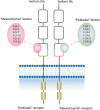FGF/FGFR signaling in adrenocortical development and tumorigenesis: novel potential therapeutic targets in adrenocortical carcinoma
- PMID: 35583844
- PMCID: PMC9385797
- DOI: 10.1007/s12020-022-03074-z
FGF/FGFR signaling in adrenocortical development and tumorigenesis: novel potential therapeutic targets in adrenocortical carcinoma
Abstract
FGF/FGFR signaling regulates embryogenesis, angiogenesis, tissue homeostasis and wound repair by modulating proliferation, differentiation, survival, migration and metabolism of target cells. Understandably, compelling evidence for deregulated FGF signaling in the development and progression of different types of tumors continue to emerge and FGFR inhibitors arise as potential targeted therapeutic agents, particularly in tumors harboring aberrant FGFR signaling. There is first evidence of a dual role of the FGF/FGFR system in both organogenesis and tumorigenesis, of which this review aims to provide an overview. FGF-1 and FGF-2 are expressed in the adrenal cortex and are the most powerful mitogens for adrenocortical cells. Physiologically, they are involved in development and maintenance of the adrenal gland and bind to a family of four tyrosine kinase receptors, among which FGFR1 and FGFR4 are the most strongly expressed in the adrenal cortex. The repeatedly proven overexpression of these two FGFRs also in adrenocortical cancer is thus likely a sign of their participation in proliferation and vascularization, though the exact downstream mechanisms are not yet elucidated. Thus, FGFRs potentially offer novel therapeutic targets also for adrenocortical carcinoma, a type of cancer resistant to conventional antimitotic agents.
Keywords: Adrenocortical development; Adrenocortical tumors; FGF-pathway; FGFR; FGFR-inhibitors.
© 2022. The Author(s).
Conflict of interest statement
The authors declare no competing interests.
Figures
Comment in
-
Eighth International Adrenal Cancer Symposium Brescia, Italy, September 30 to October 1-2, 2021.Endocrine. 2022 Sep;77(3):409-410. doi: 10.1007/s12020-022-03147-z. Endocrine. 2022. PMID: 35867326 Free PMC article. No abstract available.
References
Publication types
MeSH terms
Substances
LinkOut - more resources
Full Text Sources
Medical
Miscellaneous


